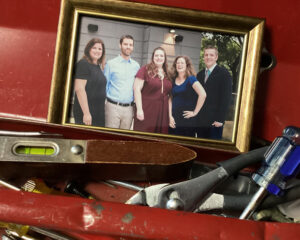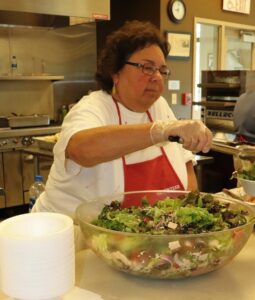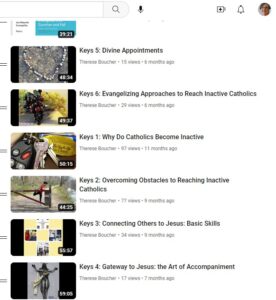There are many sayings that acknowledge a person’s goodness: One is “You’re an angel.” Another is, “You are a breath of fresh air.” And, from earlier years we have, “You are a lifesaver.” or “You are a peach.”
Some of us also describe deceased friends and family by saying, “Heaven has gained a new angel today.” But is this really true? Do we really think that our loved one has turned into a fat, little, winged cherubim? Or has become an invisible messenger like Gabriel, who visited the Blessed Virgin Mary? No. People are people and angels are angels. These are two different kinds of beings. So, it is important to let go of any romanticized idea that they are angels. And it is even more important. to explore the Christ-centered connections we do have.
 First, the belief that family members have become angels, is only a shadow of our desire to be fully united with God, and also reunited with loved ones in heaven. Our hope rests with a merciful God who will forgive and ultimately grant us a place in heaven, alongside loved ones, and in the company of all the angels, singing God’s praises. This connection that unites heaven and earth is called the communion of saints and encompasses all the faithful in heaven and on earth, throughout all time. For example, when John needed more work, within twenty-four hours of his father’s death, he received four invitations to speak, and the consolation that his father still loves him. Also, when our youngest had been refused much needed help in school, she was granted assistance at an appeals meeting on the feast of St. Francis Cabrini, a family friend.
First, the belief that family members have become angels, is only a shadow of our desire to be fully united with God, and also reunited with loved ones in heaven. Our hope rests with a merciful God who will forgive and ultimately grant us a place in heaven, alongside loved ones, and in the company of all the angels, singing God’s praises. This connection that unites heaven and earth is called the communion of saints and encompasses all the faithful in heaven and on earth, throughout all time. For example, when John needed more work, within twenty-four hours of his father’s death, he received four invitations to speak, and the consolation that his father still loves him. Also, when our youngest had been refused much needed help in school, she was granted assistance at an appeals meeting on the feast of St. Francis Cabrini, a family friend.
Second, helping those in need, is what good and holy people can do in heaven, as St Therese of Lisieux promised. So, we can expect prayerful help from those who have loved us. They do not stop caring about our needs. But what does their caring love look like? It means embracing the shared call to intercessory prayer. We pray for them and they pray for us. (For more read: People Don’t Become Angels When They Die. By Jim McDermott, (America Magazine. June 07, 2022. )
Third, it is in keeping with our faith to believe that our loved ones can and do help us, even as we all await the resurrection of our bodies. Every time we pray to an “official” Saint, for example, we hope for a newness of life that encompasses body and soul. This is why the process of canonizing a Saint requires evidence of a saint’s miraculous intercession for a particular person, who has been made whole in some way.
Finally, pray with confidence to your family saint with a little “s.” –Your deceased grandparent, spouse, or friend. This person may not have a big “Saint” attached to his or her name, but we can hope that they are interceding for us, through the mercy of a forgiving God, and through the workings of the Holy Spirt. As the Apostles Creed proclaims, “I believe in the Holy Spirit… the communion of saints, the forgiveness of sins, the resurrection of the body, and life everlasting”. You might also end your interceding to this saint, with a prayer to Jesus, since he is the focus of our hope on earth and the eternal light of heaven.















